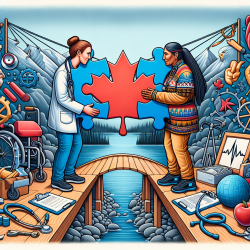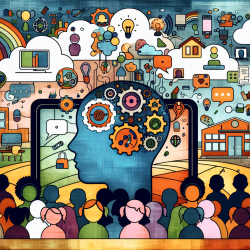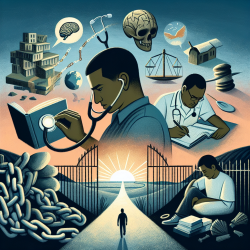Introduction
In the journey towards reconciliation and improving health outcomes for Indigenous Peoples, occupational therapists play a pivotal role. The recent study, "Knowledge Gaps Regarding Indigenous Health in Occupational Therapy: A National Survey," sheds light on the existing knowledge gaps among occupational therapists in Canada. This blog aims to explore the findings and encourage practitioners to enhance their skills and knowledge to foster culturally safer practices.
Understanding the Knowledge Gaps
The study identified six key themes representing knowledge gaps in the field:
- Lack of Foundational Knowledge: Many therapists lack comprehensive training and awareness of the diversity and historical context of Indigenous Peoples.
- Power Relations: There is a need for critical reflexivity to address unconscious biases and the colonial underpinnings of occupational therapy practices.
- Lifelong Learning: Continuous education and acknowledgment of clients as experts are essential for effective practice.
- Need for Appropriate Tools/Approaches: The development and use of culturally appropriate tools and flexible approaches are crucial.
- Respectful Collaboration: Building partnerships with Indigenous communities and incorporating traditional knowledge into practice are necessary.
- Environmental Influences: Awareness of systemic and workplace barriers is vital for creating inclusive and respectful spaces.
Decolonizing Occupational Therapy
Decolonization involves engaging in critical reflexivity and examining the cultural assumptions of occupational therapy. Practitioners must challenge their biases and the Eurocentric models that may not align with Indigenous perspectives. This process is crucial for dismantling colonial structures and promoting health equity.
Building Collaborative Relationships
Emphasizing relationship-building is fundamental. Occupational therapists should focus on establishing trust and mutual respect with Indigenous clients, recognizing the value of their knowledge and experiences. This approach aligns with the Truth and Reconciliation Commission's Calls to Action, which advocate for the integration of Indigenous healing practices in healthcare.
Training and Education
Addressing knowledge gaps requires targeted training and education. Occupational therapists should seek out anti-oppressive, anti-racist, and decolonizing educational strategies. These should be developed in collaboration with local Indigenous communities to ensure relevance and effectiveness.
Conclusion
By addressing these knowledge gaps, occupational therapists can contribute to the reconciliation process and improve health outcomes for Indigenous Peoples. Practitioners are encouraged to engage in ongoing learning and collaboration with Indigenous communities to foster culturally safer practices.
To read the original research paper, please follow this link: Knowledge Gaps Regarding Indigenous Health in Occupational Therapy: A National Survey.










